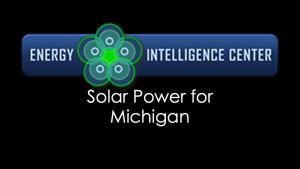- 12 reads

Our GREENandSAVE Team is pleased to share information like this about sustainability solution providers. If you would like to submit information on your company, please contact us.
The Energy Intelligence Center (EIC) has a strategic partnership with Jordan Energy which is a top solar solutions provider. This article includes some highlights as well as Solar power news in Michigan. EIC’s initial founder, Charlie Szoradi, has a long-standing relationship with Jordan Energy’s founder, Bill Jordan. Charlie engaged Bill and his team for the solar system on Charlie’s beach house in Stone Harbor, New Jersey. Charlie also recently introduced Jordan Energy to one of EIC’s largest clients for major industrial rooftop systems in Pennsylvania and Texas. Click to learn more about Sustainability_Charlie on Instagram. For his Youtube channel click here: Learn from Looking.
In our consulting and system design capacity, we focus on solutions and specifications that are agnostic to specific technology providers. We undertake rigorous due diligence to determine the performance of clean technologies across the dynamic sustainability marketplace. To learn more about solar power and other clean tech partnerships, Contact Energy Intelligence team.
Here is an example of some Solar Power News in Michigan:
Solar power’s move into agriculture: Are farmers ready, willing?
Solar power could be the next big ag commodity.
Or so that’s a hope for Consumers Energy, which describes its Clean Energy Plan as a win for farmers, consumers, and environmentalists.
The Jackson-based company wants to add 8,000 megawatts of utility-scale solar power by 2040 while eliminating coal electricity and achieving net-zero carbon emissions. Projects are already underway or proposed for Genesee, Hillsdale, Jackson, Calhoun, and Washtenaw counties.
“Solar is really the foundation of our Clean Energy Plan,” said Tom Clark, executive director of Consumers Energy’s clean energy programs. “We've got a Clean Energy Plan to meet Michigan's energy needs for the next 20 years.”
That plan includes using up to 80,000 acres of Michigan land, which is why Consumers Energy needs farmers’ help.
So far the company’s contracted out about 1,100 megawatts of solar power to bring online.
“It's not necessarily for everyone,” Clark told Michigan Farm News. “There are certainly farmers who really want to see their land continued to be used for agricultural purposes and feel very passionately about that. But what we are seeing are farmers who appreciate the opportunity to have solar on a portion of their land.”
Clark said those farmers benefit from the steady income of having a solar easement. He said a typical long-term easement lasts about 35 years.
However, he didn’t disclose the financial terms of a contract.
“If you've got solar panels on some chunkier land, you're going to get a check annually,” Clark said. “That’s going to compensate you for having them there, whether it's a bumper year or a bust year.”
Some land requirements for solar power include finding between 500 to 900 acres of flat land that is free of trees and contains limited water features.
A project like this would bring in about 100 megawatts, Clark said, noting most easement agreements contain provisions for the removal of equipment at the end of the project’s life.
“It's a way to help with this clean energy transformation that is so important to our communities and world,” Clark added. “This will enable us to move away from fossil fuels, and it's a very steady, stable income stream for our agricultural communities which can sometimes be used to help stabilize and keep a farm operating.”
Consumers Energy announced in May it would add 300 megawatts of clean energy through two solar projects developed in Genesee and Hillsdale counties. The projects will power roughly 150,000 homes, with utility-scale company Ranger Power owning and developing the sites.
Other possible locations for solar land include brownfield sites and publicly owned properties.
“We want to reduce the environmental impact of energy consumption, and we know that we've got to address the carbon challenge from a climate-change perspective,” he said. “That’s the motivation to really exit the coal business.”
Clark said solar power is one of the most cost-effective ways to generate electricity.

